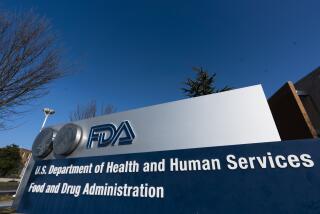UCI Clinic Is Examining Family Ties to Cancers : Health: Doctors check for a predisposition to cancer and then help patients try to prevent the disease.
- Share via
When former President Jimmy Carter’s sister, Gloria Carter Spann, was found to have pancreatic cancer in December, a leading oncologist suggested that the whole family undergo tests for that type of cancer.
Carter’s father, James Earl Carter Sr.; his brother, Billy Carter, and his sister, Ruth Carter Stapleton, all died of pancreatic cancer.
And after actress Gilda Radner died last year of ovarian cancer, New York cancer researcher H. Steven Piver discovered that one of Radner’s cousins and probably also her grandmother and aunt had died of that type of cancer.
“If Gilda Radner had known that she had two relatives with the disease, her diagnosis probably would have been made much earlier, and she might be alive today,” Piver said. “Not knowing her history, it took doctors a year to make the diagnosis.”
Concerned that many people have a “genetic predisposition” for cancer, doctors at the UC Irvine College of Medicine are opening a new cancer prevention clinic in June.
Through a detailed look at family medical history, work history, a nutritional evaluation and a physical exam, UCI doctors and geneticists will assess whether a person is at risk for cancer and recommend ways to avoid contracting the disease.
Their two-hour, $250 evaluation at UCI’s medical clinic in Irvine is not a guarantee that a person will not get cancer, said oncologist Frank L. Meyskens Jr., a co-director of the new Prevention and Family Cancer Center.
But, he noted, recent advances in genetics let doctors pinpoint those at high risk and offer ways to lower that risk.
“If your mother and sister had breast cancer before the age of 40, and your father had prostate cancer, we can say, ‘Gee, you’re a setup for some kind of cancer,’ ” Meyskens said.
And if that is the case, he and other doctors can suggest “what they can do to hedge their bets”--perhaps a switch to a high-fiber, low-cholesterol diet and frequent physical exams, so that if cancer occurs, it can be treated early.
He noted that general recommendations for preventing cancer are often ignored, “but when somebody knows they’re at a very high risk, they’ll listen.”
The UCI program--the first in this area--is the latest in a host of cancer prevention programs that have started in the last decade:
In San Francisco, Children’s Hospital screens families for cancer and also maintains an unusual DNA bank where the genetic markers are stored in hope of tracking the disease in relatives decades from now.
In New York, the prestigious Memorial Sloan-Kettering Cancer Center has long offered screenings and recommendations on ways to prevent cancer.
The American Cancer Society started clinics for the poor in September in Oakland, Harlem, N.Y. and Dade County, Fla. Besides offering free mammograms and other free medical screenings, counselors look at family history and such personal habits as smoking or alcohol use that increase one’s risk for cancer.
These clinics have opened in an era of strong interest in personal health, especially in Southern California, Meyskens noted.
They also come at a time when cancer specialists have become increasingly interested in “cancer syndromes,” a genetic predisposition for the disease.
“I’ve learned that these problems--family relatedness of cancer--are much more common than I suspected,” said Meyskens, who three years ago began a similar prevention clinic at the University of Arizona.
The program is not expected to be a moneymaker for the deficit-ridden medical center, but Meyskens said it could turn a profit if the clinic identifies many patients with cancer who need “additional workups.”
The purpose, however, is to provide a community service, he said.
Also excited about preventing cancer is clinic co-director Huan Le, an assistant professor of general internal medicine.
In a routine physical, he and other internists often do not have time to get a detailed family history of cancer, Le said, but in the new clinic, “we actually pin down the diagnosis of family members. We ask the patient to bring medical records in. We will look at the pathology report on the family members’ problems.”
And if the family history includes a rare form of cancer, “we’ll do research, call in specialists around the country and ask their opinion,” Le said. The clinic patient will then get a written evaluation two weeks after the initial exam.
The prevention clinic’s evaluation begins with the first phone call, Meyskens said, when the caller will be asked to relate briefly the incidence of cancer in the patient’s family. Also, before a person comes to Irvine for a physical exam and an interview with a genetics expert, the patient will be asked to fill out an extensive questionnaire.
The idea, Meyskens said, is to “prompt their memory before they come.”
Often, he said, people know “Aunt Tilly died of something--but they don’t always know what. Sometimes it’s important enough to know--or to track down.”
After the medical history and a physical, blood will be drawn, then either Meyskens or Le will review preliminary findings with the patient.
Sometimes Meyskens or Le will also order other tests--perhaps a colonoscopy if the medical history indicated an extensive family history of colon cancer, Meyskens said.
“Or if somebody was 25 and their mother and sister had died of breast cancer,” he said, “we’d probably order a mammogram.”
To schedule an appointment, patients can call an information line at (714) 634-6316.
Meyskens invites anyone with a family history of cancer to seek an appointment, but he especially urges adults or children with the following backgrounds to call:
A family member with colon cancer, multiple intestinal polyps (polyposis), breast cancer or melanoma.
Two or more family members with the same type of cancer.
Four or more relatives with cancer of any type. (This includes parents, grandparents, brothers or sisters, uncles and aunts.)






